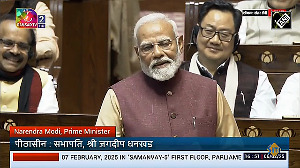If the city runs, it is thanks to the people who brave every odd. The city has to thank the people, not its governors for its survival, says Mahesh Vijapurkar.
When the grand building to house Mumbai's civic body was built, the then leaders had engraved the words Urbs Prima in Indis -- India's prime city, and had the reputation of being the best city at that time east of the Suez. A city to which people flocked, where fortunes were made, where working class came to be and in which everyone took pride for a variety of reasons.
By now, the city has morphed. From being urbs prima to merely a city which has utility, where everyone is taking out something and hardly giving anything back. Unlike, surely, the time when that engraving was put up where the city and the people had an emotional connection. The change has been so stark that the city civic body may as well take it down.
Especially so because if there is one single entity responsible for the city's decay where people are pushed to live on the edge, it is the Municipal Corporation of Greater Mumbai. Merely quoting the statistics and drawing comparisons would not do any more. What is the point of speaking about a budget equivalent to any small Indian state's, or the size of its population etc?
Mismanaging the city is by now the corporate philosophy of the civic body. It has its warts visible round the year -- unclean streets, piled up garbage, contaminated drinking water, storm water drains that cannot empty the city of the normal rainfall quick enough, stinking markets, sidewalks overcrowded with hawkers, potholes, et al. You name it and it scarily stares you in the face.
Sure enough, the citizens are insular too but from what I have heard from all the people I know is that they have been made blinkered too because the leadership has failed. Here, it is not the issue of an individual but the collective leadership as embodied in the civic body where the city fathers are seen as looters, not pace setters for a clean and working city.
Old timers who have seen a better Mumbai, especially till the 1950s, have a counter question posed to me. Would Mumbai have been in such tatters had the leadership been that of, say, Sir Phiroze Shah Mehta? Or has anyone among its bureaucrats shown the same zeal as Arthur Crawford, its first commissioner, did? They had feelings for the city, did not look at it as mere collection of statistics, including the people. If their successors had any, 60 per cent and more would not be in slums.
It would be easy to argue that insularity of the population is what keeps the city dirty, for instance, but it is not the citizenry that lays out poor roads which cannot bear a single downpour before the dirty deal between the road-building contractors and the civic body's functionaries, both political and bureaucratic are graphically exposed. It is not the citizenry which allows fake billing on pretended trips of garbage compactors.
It is not the man-on-the-street who designs and develops projects to house people with every flaw and weakness -- including the human components involved -- in the city exploited. It is the money-throwing developer-builder class that has a vice-like grip on the city; they have not paid the fines and dues worth crores and the civic body has not bothered to collect it. There can hardly be a building without a violation encouraged or a blind eye turned to.
In just about every sector where the civic body comes in, one wonders if there at all is a civic body superintending the city. Its concerns not being citizen-centric, and therefore, city-centric, raises doubts about the very purpose of having a municipal corporation. Obviously, those who run it are grubby and an exceptional politician or a bureaucrat can hardly make a dent in the system. It is a system that can beat the citizen.
Fortunately the city is not dead, in spite of a civic body doing its best -- or worst? -- to kill it which obviates the possibility of a thorough post-mortem. But the best audit of the city is a good rain and the warts get exposed year upon year. From March onwards, newspapers carry reports about the plans and resolve of the civic body to keep the city running.
Come mid-June, the lies are exposed. Like how contractors have not cleaned the drains. Like how they bid at lower than impossible rates and execute very little of work. How blacklisting of contractors has no meaning because the same people bid with different letterheads and get the opportunity to make oodles of money.
This is a cycle that goes on and on without let. And the city suffers, each year taking it down a notch. This does not amuse the citizens. It only reduces the confidence in the city government. If the city runs, it is thanks to the people who brave every odd. The city has to thank the people, not its governors for its survival.
Mahesh Vijapurkar is a Thane-based commentator who takes the common man's perspective seriously.






 © 2025
© 2025